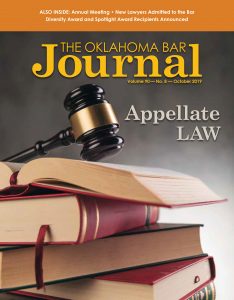Oklahoma Bar Journal
October 2019 | Appellate Law

Feature Articles
Interlocutory Appeals in Oklahoma: What, When and How
“An interlocutory order is an order which is not ‘final,’ does not culminate in a judgment [and] leaves the parties before the tribunal to try the issues on the merits...”1 An interlocutory appeal is an “appeal of an order in a case that has not reached its conclusion in the trial court.”2
Reconsider Your Motion to Reconsider: How Post-Trial Motions Affect Your Civil Appeal
After a judgment, decree or final order is filed, the unsuccessful party may appeal that decision to the Supreme Court of Oklahoma and/or seek post-trial relief from the trial court. While a post-trial motion is not a jurisdictional prerequisite for filing an appeal, often the unsuccessful party elects to first or concurrently ask the trial court to review its own appealable order.1 This article addresses three types of post-trial motions: 1) motions for new trial, 2) motions to vacate or modify, and 3) motions to reconsider and, specifically, how the rules governing these motions may affect your civil appeal.2
Appealable Orders: Asking the Key Questions
The Oklahoma Supreme Court reviews incoming appeals for jurisdictional purposes. This is also known as the court’s inquiry into its appellate jurisdiction.1 Whether you are a practitioner who is filing your first appeal or a practitioner who regularly files appeals, you may find it helpful to know how an appeal crosses the court’s jurisdictional hurdle. It involves asking the three questions below.
Proper Practice on Certiorari: Avoiding Common Pitfalls and Crafting Better Arguments
Petitioning the Supreme Court of Oklahoma for certiorari review of an opinion of the Court of Civil Appeals is a common part of appellate practice.1 This article aims to provide litigants and attorneys with some guidance on what they should and should not do as part of the certiorari process in order to maximize the chances of obtaining their desired outcome. The article provides a short summary of the Supreme Court’s certiorari procedure, provides suggestions on how best to comply with the court’s certiorari rules, sets out common pitfalls to avoid and discusses what to include in a petition for certiorari.
Practical Tips for Civil Appellate Brief Writing in Oklahoma State Court
When submitting an appeal to the Oklahoma Supreme Court, always look first to the Oklahoma Supreme Court Rules.1 The answers to a large majority of technical questions – when to file, what to include and where to submit – are included in the rules.2 Here we offer helpful tips for attorneys submitting appeals from final orders of district courts, with particular emphasis on appellate brief writing. The guidance provided herein is intended only as a “starter kit” for submitting an appeal and is not a comprehensive or exhaustive review of the rules. We include additional advice regarding style and tone in appellate briefs with the intention of providing insight into effective advocacy at the appellate level.3
Building a Better Brief: Using Each Section of Your Appellate Brief to Make Your Case
The ability to write persuasively is the appellate practitioner’s most important skill, particularly given that most appeals are decided without oral argument. In an Oklahoma civil appeal, you only have 30 pages to make your case,1 so it is imperative that you incorporate persuasive writing strategies into each section of your brief. Below are several suggestions for ensuring that your appellate brief is built to persuade.
Trials and Tribulations From the Appellate Vantage Point
I was amazed when I first became an appellate judge to discover how little I knew from my trial judge experience about how to avoid getting reversed on appeal. As a trial judge, I got opinions stating: “This is an appeal from a decision by Judge Jane Wiseman – other grounds for reversal include...” Now I suppose it may depend, from your vantage point as a lawyer, on whether you want to keep the trial judge from committing reversible error or you want to introduce some to have something on appeal if your case is going south. I can’t say I’ve ever seen the latter situation, but I’m sure it’s not unheard of.
Plus Articles
OBA Diversity Award Winners Announced
The OBA Diversity Committee is set to host its Ada Lois Sipuel Fisher Diversity Awards Dinner Oct. 17 in Oklahoma City. The event will feature a keynote address from OCU School of Law Dean Jim Roth.
Mona Salyer Lambird Spotlight Award Recipients to be Honored
The Spotlight Awards were created in 1996 to annually honor five women who have distinguished themselves in the legal profession and who have lighted the way for other women. The award was later renamed to honor 1996 OBA President Mona Salyer Lambird, the first woman to serve as OBA president and one of the award’s first recipients, who died in 1999.
